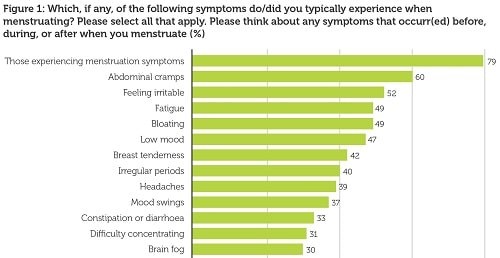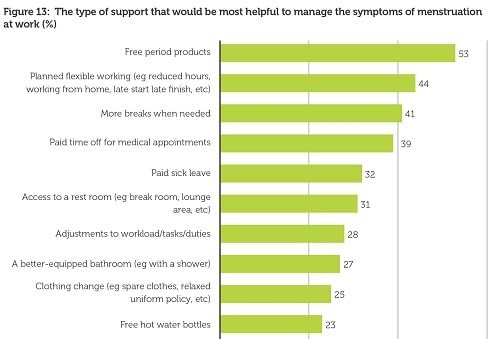Menstruation is a natural part of many employees’ lives, and it shouldn’t be a barrier to success or wellbeing.
Opinion
Why we need to build supportive cultures around menstrual health at work
However, according to the CIPD’s new report Menstruation and support at work, which surveyed more than 2,000 women, two-thirds (69 per cent) have a negative experience at work because of their menstruation symptoms.
Despite menstruation being a normal part of life, and the prevalence of menstrual health challenges, these issues are often shrouded in taboo and silence in the workplace. This taboo is linked to broader societal attitudes around menstruation and menstrual health issues, but also because dedicated menstruation and menstrual health policies and provisions are still rare.
Employers have an important role to play in helping to normalise menstruation in the workplace and creating supportive and inclusive cultures where women can thrive at work. At the CIPD, we’re calling on organisations to create awareness, tackle the stigma associated with menstruation, and train managers to be confident, comfortable and inclusive when talking to employees about menstrual health.
 Two-thirds (69 per cent) of women told the CIPD they have had a negative experience at work because of their menstruation symptoms. Photograph: iStock
Two-thirds (69 per cent) of women told the CIPD they have had a negative experience at work because of their menstruation symptoms. Photograph: iStock
The effect of menstruation on employees
The most common symptoms from our latest report include abdominal cramps (62 per cent), irritability (52 per cent), fatigue (49 per cent) and bloating (49 per cent) but there are a wide range of symptoms experienced.
Of those who experienced symptoms, three-fifths (61 per cent) said they had worked when they didn’t feel well enough to, and one in five (20 per cent) took sick leave.
 Source: CIPD, Menstruation and support at work report 2023
Source: CIPD, Menstruation and support at work report 2023
Our report findings make it clear that menstruation symptoms can have a serious and negative impact on the careers of those who experience it. In fact:
- 63 per cent felt less able to concentrate
- Half (50 per cent) felt an increased amount of stress
- 49 per cent felt less patient with colleagues or clients
- 38 per cent said they felt less confident at work.
As well as the more common symptoms of menstruation, 15 per cent of women said they also had a menstrual health condition such as polycystic ovary syndrome (PCOS), premenstrual dysphoric disorder (PMDD) or endometriosis. Of the employees who have a formal diagnosis of such a condition, 81 per cent said that menstruation symptoms have had a negative impact on them at work.
There’s still a taboo around talking about menstruation at work
More than half (53 per cent) of respondents had been unable to go into work at some point because of their symptoms and for a small minority (four per cent) this was the case every month.
 Rachel Suff: "Our findings show that most employees don’t feel a strong sense of support in their organisation in relation to their menstrual cycle."
Rachel Suff: "Our findings show that most employees don’t feel a strong sense of support in their organisation in relation to their menstrual cycle."
Just one in five (20 per cent) always tell their manager that their absence is related to their menstrual cycle, while around half of employees (49 per cent) said they never tell their manager their absence is related to their menstrual cycle.
When asked why they felt unable to tell their manager the real reason they were unable to go into work, employees said it was because that they felt the problem would be trivialised, followed closely by feeling embarrassed and that they prefer to keep the matter private.
More support is needed in the workplace
Our findings show that most employees don’t feel a strong sense of support in their organisation in relation to their menstrual cycle.
People are much more likely to feel supported by colleagues than by their employer or manager (41 per cent compared with 21 per cent and 26 per cent, respectively).
Just over one in 10 (12 per cent) of employees report that their organisation provides support for menstruation and menstrual health; for example, in the form of a policy, guidance or training.
The most common type of support is free period products (18 per cent) followed by paid sick leave (15 per cent) and paid time off for medical appointments (12 per cent). Any other type of support is even less commonly available.
The most helpful types of support
When it comes to the most helpful types of support, respondents point to free period products, planned flexible working such as reduced hours and flexibility in start and finish times, and access to more breaks when needed. Paid time off for medical appointments and paid sick leave are also welcomed, as is access to a rest room.
There are steps that organisations can take to create more comfortable working experiences and make workplaces more menstruation friendly.
 Claire McCartney: "A lot can be done without huge cost to businesses, including the adoption of more flexible working practices – for example, around location, time and tasks."
Claire McCartney: "A lot can be done without huge cost to businesses, including the adoption of more flexible working practices – for example, around location, time and tasks."
These are outlined in our practical guidance and can include simple adjustments in the workplace:
- Offering free or subsidised period products or an ‘emergency supplies’ store. This can help with the financial and logistical challenges that can accompany menstruation
- Providing the opportunity for employees to store sanitary products and fresh clothes
- Offering free painkillers
- Authorising the use of a TENS machine, heat pads, hot water bottles or another pain-relieving device, or access to appropriate alternative therapies
- Ensuring all staff have access to toilets and discrete places to change clothes
Consulting staff on uniform design, including consideration of colours that better hide menstrual leaking, looser fitting and/or materials that stretch to better accommodate bloating - Having spare supplies of uniform, of various sizes.
A lot can be done without huge cost to businesses, including the adoption of more flexible working practices – for example, around location, time and tasks.
 Source: CIPD, Menstruation and support at work report 2023
Source: CIPD, Menstruation and support at work report 2023
Access to digital health apps/symptom trackers, ensuring suitable rest breaks, introducing menstruation advocates/champions, with suitable training and resources, and comprehensive health insurance policies can also make a big difference to those experiencing menstruation symptoms.
These can signal to employees and management that menstruation is a topic that can be discussed freely and without embarrassment in the workplace, as well as offering specific support.
Our recommendations for employers
As part of our new report and guidance we’ve set out recommendations for organisations to better support menstrual health in the workplace:
- Build an open and inclusive culture to normalise menstruation in the workplace, through supportive discussions and open dialogue
- Create awareness and tackle stigma, for example, through having a dedicated section for information and resources on the company intranet
- Develop a support framework. This can include policy provision, support pathways, guidance and training
- Train and support people managers. Training should include information about the diversity of menstruation experiences and the importance of sensitivity and discretion.
Organisations looking to support employees with menstrual health conditions should also consider embedding good people management practices; creating the climate where people feel able to talk about their conditions and symptoms; ensuring employees have easy access to information and support; managing absence and performance management with compassion and flexibility; and providing access to, and training in, work adjustments and self-management support.
Employers can greatly improve the working lives of employees who experience menstruation symptoms by creating inclusive and supportive work environments.
For more information see: cipd.org
Claire McCartney and Rachel Suff are senior policy advisers at CIPD
OPINION

Is workplace health safe in 2026?
By Kevin Bampton, BOHS on 10 February 2026
UK Government efforts to boost the economy and employment levels through approaches such as deregulation pose a serious threat to the country’s workplace safety standards and the health of our workforce.

How stress and burnout will shape the workplace in 2026
By Charlotte Maxwell-Davies, Mental Health UK on 09 February 2026
Burnout is rapidly becoming one of the nation’s most significant workplace challenges. It is emerging as a defining issue for organisations and wider society, as the UK contends with a long-term sickness crisis driven by poor mental health. Stress can be motivating in short bursts, but when left unmanaged it contributes to work absences and lost productivity, as well as presenting a clear risk to the health of workers.

A new year, a new approach to risk?
By Mike Robinson FCA, British Safety Council on 02 February 2026
The rulebook is becoming obsolete faster than we can rewrite it. While bureaucracies labour to update yesterday’s regulations, the world of work transforms daily.



